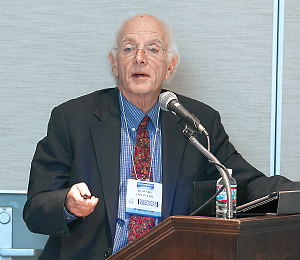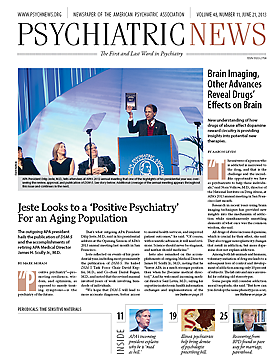Psychiatrists can have a decisive role in evaluating refugees from persecution who are seeking asylum in the United States.
Attorneys and forensic psychiatrists speaking at a symposium at APA’s 2013 annual meeting in San Francisco said rates of mental illness—especially PTSD—are high among asylum-seeking refugees. And they said psychiatrists can provide expert insight into how mental illness may affect an individual’s “credibility”—a key variable in decisions to grant asylum.
The symposium was titled “Immigration and Its Adversities: Mental Illness, Detention, and Deportation.”
Karen Musalo, J.D., a professor at the Hastings College of Law at the University of California, outlined the legal, procedural, and psychosocial issues—including the sometimes horrific histories of trauma—affecting refugees seeking asylum. She explained that there are three categories under which a refugee may merit protection in the United States: asylum, withholding, or the Convention Against Torture.
To merit asylum, the individual must meet the definition of a “refugee” as someone seeking protection in the United States because of “a well-founded fear of persecution on account of race, religion, nationality, membership in a particular social group, or political opinion.” Persecution can take many forms, including severe forms of discrimination, economic deprivation, and psychological harm, Musalo said.
The category of “withholding,” also known as “restriction on removal,” requires evidence that “life or freedom would be threatened” in the country from which he or she is fleeing on account of race, religion, nationality, membership in a particular social group, or political opinion.
Under the Convention Against Torture, an individual must establish that it is “more likely than not” that he or she would be tortured if forced to return to the proposed country of removal. Torture is defined as intentional acts that cause severe mental or physical pain.
Individuals can apply for “affirmative applications” at asylum offices around the country if they are in the United States legally or are here without legal documentation but have not been apprehended by immigration authorities; these are “nonadversarial” proceedings. Or they can enter “defensive applications” in immigration court proceedings if they have no legal right to be in the United States, are apprehended by immigration authorities, and have raised claims to protection as a “defense” to removal to their home countries.
Whether before an immigration court judge or the asylum office, an applicant’s “credibility” is a key determinant in the outcome. Criteria for determining credibility have been codified under the REAL ID Act of 2005, which cites such factors as demeanor of the applicant, consistency of written and oral statements, candor and responsiveness to questions, plausibility of the applicant’s account, and inaccuracies or falsehoods in written or oral statements.
“Many of these factors are inherently problematic given the experience of persecution or torture of the individual,” Musalo said. She emphasized that though it is widely assumed that credibility can be intuitively determined in most cases, in fact cultural factors and the effects of mental illness related to past trauma can significantly color an applicant’s presentation.
For instance, she cited the case of a young woman who appeared before an immigration judge seeking asylum. She and a circle of friends were nonviolent activists against the government of her country of origin; her fiancȳ was “disappeared,” four of his six brothers were abducted, and their dismembered bodies were later found.
The woman claimed that armed men had sought her out and that she went into hiding until she could escape from the country. But the judge found her not to be credible, citing among other reasons that her testimony was “hesitant, unemotional, and vague,” Musalo said.
“These kinds of decisions led to the recognition that adjudicators needed to be educated about the potential effect of trauma upon asylum seekers,” she said. “An expert psychological evaluation can help preclude adverse credibility findings by addressing issues of demeanor, memory—which is relevant to consistency and ability to provide detail—and inaccuracies or falsehoods.”
Forensic psychiatrist Howard Zonana, M.D., presented data and case examples from psychiatric consultations conducted at the Yale Law School’s Asylum Law Clinic for some 62 refugees from Africa, Serbia, Mexico, Central America, South America, Haiti, Jamaica, China, and the Middle East. (The clinic was established in 1990 and formalized a collaboration with the school’s law and psychiatry division in 2000.)
The rates of mental illness among these individuals were extraordinary: PTSD (84 percent), depression (61 percent), dementia /traumatic brain injury (0.5 percent), and cognitive limitations (9 percent). Approximately 9 percent had no diagnosis, and 0.5 percent were deemed to be malingering.
“Referral often begins as consultation because the attorneys and law students are having difficulty with the interviews and in formulating the legal case,” Zonana explained. “Memory problems, inconsistency, resistance to giving details are issues. The referral questions are shaped by the legal circumstance and include diagnosis of a psychiatric disorder, response to trauma, and a preemptive explanation for why the interview with the asylum officer or testimony in the court may not go smoothly.”
Zonana said an underlying agenda on the part of attorneys seeking consultation is to use the psychiatric report to bolster the credibility of the claim. But he said psychiatric reports are not intended to verity the events described by the applicant. “Rather, issues of malingering and validity of symptoms are addressed as they would be in any psychiatric evaluation and report,” he said.
For instance, he cited the case of a 26-year-old man who was convicted of armed robbery and served four years in jail. Attorneys for the man sought a psychiatric consultation to determine whether the client had a mental disorder that may have made him unable to appreciate or control his behavior when he committed the crime, resulting in his being slated for deportation to his country of origin.
Zonana said the evaluation showed malingering as well as collateral evidence of gang activity and drug dealing, and no psychiatric report was filed.
But in other cases, psychiatric evaluation proved valuable in the granting of asylum. In one instance, attorneys sought psychiatric consultation regarding a 26-year-old man they said “doesn’t talk and misses appointments” and was unforthcoming about important details. The man had fled his country of origin after being targeted for support of an opposition party.
Evaluation determined that he had depression and PTSD related to an earthquake in his country of origin. His case went to trial with the psychiatric report, and he was granted suspension of removal under the Convention Against Torture.
In another instance, attorneys sought a psychiatric evaluation for a 65-year-old man who had been a leader of political resistance in his country of origin, had been attacked there, and was now receiving care for cancer in the United States. Attorneys seeking psychiatric consultation said the man “doesn’t seem to want asylum, what he says contradicts his written documents, [and] he does not seem concerned about it.”
Evaluation determined that he had a diagnosis of dementia and was medically compromised. He was hospitalized and granted asylum.
Zonana said the “power of a psychiatric narrative” can be extremely compelling. “Having the benefit of an American, professional, erudite voice that can provide a psychiatrically or psychologically informed account of trauma and the typical kinds of response to trauma can transform a ‘case’ into a ‘person’ and can create a connection across cultural barriers.” ■

